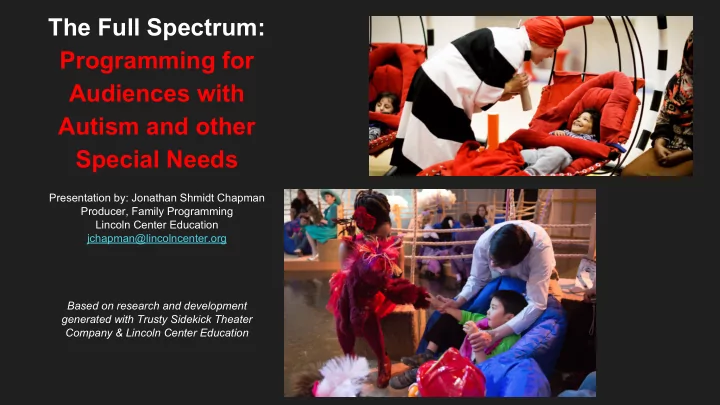

The Full Spectrum: Programming for Audiences with Autism and other Special Needs Presentation by: Jonathan Shmidt Chapman Producer, Family Programming Lincoln Center Education jchapman@lincolncenter.org Based on research and development generated with Trusty Sidekick Theater Company & Lincoln Center Education
Why is it challenging for young people on the Autism Spectrum to experience live theater? Sensory Sensitivity Challenges with Social Interaction and Communication Repetitive Behaviors
What are the benefits? Why is it important? The same intrinsic value of the performing arts as any audience member Shared experience out in community Ability to engage naturally and be celebrated for who they are Repetitive Behaviors
Performing arts experiences can actually tap into addressing some key issues for people with autism and other social or developmental disabilities: Challenges with understanding or expressing emotion / understanding the desires or needs of others Difficulty with transitions and change Sensory engagement Symbolic thinking and expression
What is the current landscape of work being offered to this audience?
“Autism-Friendly / Relaxed / Sensory-Friendly”
Work Designed Especially For this audience...
Oily Cart - London, UK
Bamboozle Theatre - Leicester, UK
Replay Theatre Company - Northern Ireland, UK
Frozen Light - Norwich, UK
Sensorium - Western Australia
Trusty Sidekick Theater Company - New York, USA
Red Kite - Chicago, USA
Bluelaces - New York, USA
Rose Theater - Omaha, USA Bricolage - Pittsburgh, USA Yellow Finch Project - Croton Falls, USA
VIDEO LINKS SENSORIUM: https://www.youtube.com/watch?v=5CaufLZFp_4 TRUSTY SIDEKICK: https://www.youtube.com/watch?v=QDCYGK4_yLM OILY CART: https://www.youtube.com/watch?v=MXUh4p3R8_4 REPLAY: https://vimeo.com/64087943
How can we design an environment that doesn’t dictate a “right” or “wrong” way to participate? How can we ensure that the entire experience is taking the needs of the audience into account? How can the show adapt in the moment to a wide range of audience responses without compromising artistic integrity of the work? What kind of narrative content will actually connect with the audience?
“Ingredients” - Sensory-Friendly ● Reduction of loud or jarring sounds ● Reductions in flashing or strobe lights ● Modification of the house lights during the performance ● Accommodated house rules: audience members are free to talk or move during the show ● Extra staff and volunteer support. ● Designated “Quiet Room” and “Take a Break Space” ● Guidance and sensory supports (fidgets, earplugs, noise cancelling headphones) available in the lobby before the show
“Ingredients” - Sensory-Friendly
“Ingredients” - Designed Especially For...
“Ingredients” - Developed by Trusty Sidekick Theater Company 1:1 Interaction and Adaptation
“Ingredients” - Developed by Trusty Sidekick Theater Company Immersive Space / Sensory-Friendly Environment
“Ingredients” - Developed by Trusty Sidekick Theater Company Multi-Sensory
“Ingredients” - Developed by Trusty Sidekick Theater Company Episodic Structure With Clear Schedule
“Ingredients” - Developed by Trusty Sidekick Theater Company Clearly Defined Characters
“Ingredients” - Developed by Trusty Sidekick Theater Company Repetition
“Ingredients” - Developed by Trusty Sidekick Theater Company Zoom In / Zoom Out Structure
“Ingredients” - Developed by Trusty Sidekick Theater Company Pre-Show Materials and Engagement
CHALLENGES - REASONS FOR “CAN’T” Scale Funding Intensive time / care to conceptualizing venue and staff training
REWARDS - REASONS FOR “YES” Audience Impact Audience Visibility / “Radical Hospitality” Ripple effect on venue, staff, other programming and wider community
QUESTIONS How can we sustainably program this work and support its development? How can we collaborate nationally and internationally to make this more viable? How can we effectively advocate for impact over scale (not always but sometimes)?
Recommend
More recommend